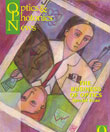
November 1994 Issue
- Optoelectronics 2000: The Impact of Society
- Building an Engineering Career in a Time of Change
- What is Engineering?
- Trends in U.S. Industrial Research and Development
- Engineers in Manufacturing
- Managing New Product Development
- How to Start a Successful Business
- Corporate Strategy
- Financing Technology Companies For Maximum Value
- Marketing is Engineering
- When Too Much Knowledge is a Bad Thing
- Browse all Issues
Feature Articles
Optoelectronics 2000: The Impact of Society
At the turn of the century, the technology professional will operate in a world utterly different from the environment that prevailed only a decade earlier. The changes are already underway. They appear in new relationships between technology-based companies, their customers, competitors, and governments. This is particularly true in optics and photonics. As technologies, these disciplines find applications across national and industrial boundaries.
by Howard RauschBuilding an Engineering Career in a Time of Change
We live in a time of rapid change, and the rate of change is not likely to subside. Fax machines, cellular phones, home offices, and worldwide communications are compressing the time scales on which engineers work. Over the past five years, tens of thousands of technical people have made a transition from the defense industry to the commercial sector, where the growth opportunities require a distinctly different set of skills. Over the past 20 years, students have progressed from slide rules to calculators to computers to engineering workstations.
by Stephen D. FantoneThe editor asked me to explain what I've learned during my 30 years as an engineer, perhaps to offer some advice to young engineers and students. One thing I've learned is that giving advice is usually inadvisable, and what I have to say may seem overly fundamental. But if you're interested, I'll tell you what I wish I had clearly known long ago. Engineering is putting knowledge of Nature to practical use. The end result of engineering is some physical thing: a machine, a tool, a gadget.
by Frank LueckeTrends in U.S. Industrial Research and Development
In this article, I describe the most important changes in the industrial R&D environment and offer recommendations describing what R&D managers can do to adapt successfully to these changes. Finally, I will offer a model for an industrial R&D organization designed to optimize its value to its sponsors in the 1990s.
by Anthony J. DemariaManufacturing offers engineers a wide range of opportunities to be creative in relation to ideas, processes, hardware, and people. In any business that makes and sells products, most engineers participate directly or indirectly in manufacturing. This article discusses manufacturing's central role in the organization and the ways in which engineers contribute to its success. The discussion applies to companies that produce a wide range of goods, but excludes those that specialize in software or services.
by Jay EastmanManaging New Product Development
My assignment is to communicate some of my thoughts on the successful development and introduction of new products. I will concentrate on general principles because they apply equally well to software, hardware, services, or some combination of these elements. This discussion applies to technically rich products and excludes consumer products, fads, and other products that might be distinguished only by the way they are marketed.
by Robert J. PotterHow to Start a Successful Business
I'm writing this article to provide a framework that describes what business is all about. Awareness of your business environment can be helpful, no matter what you do. And once you know that starting a business is not difficult or risky, you'll be more likely to consider entrepreneurship as a career option. While business is not for everyone, you can start a successful business if you want to. I took the plunge more than 20 years ago, and I have absolutely no regrets.
by Milton ChangTo improve the chances that we reach our goals and, not incidentally, reduce overall stress on a system, we need to have a framework to deal with uncertainty. In short, we need a strategy. A strategy is nothing but a framework for making choices and taking action. It is a template for deciding how we spend our individual and corporate time, energy, and money. Ultimately, a strategy must define what are the "right things" to do, the "right way" of doing them, and the "right time" to have them done.
by Donald B. KeckFinancing Technology Companies For Maximum Value
To start a new technology business or finance a major expansion, you need capital. However, most entrepreneurs don't have an adequate understanding of high finance. The financing process can be an entrepreneur's most unpredictable and chancy task as he or she pieces together an emerging business.
by Denny S. RojaFrom the beginning, God created the heavens and the earth, light and darkness, good and evil, engineering and marketing. These divisions have always been considered eternal. It would be as blasphemous for an engineer to presume to master marketing skills as it would be ludicrous to contemplate the reverse. And thus it has come to pass, that engineers have kept themselves pure, and that marketers have wallowed in their defilements, and that investors have lost patience with each.
by Geoffrey A. MooreWhen Too Much Knowledge is a Bad Thing
As a lens designer, it is my job to ensure that a lens will produce a crisp and clear image that is free from aberrations of all kinds. Spherical aberration and coma are what I eat for breakfast every morning, but what really gets to me is my nemesis: Lateral Chromatic Aberration. Lateral color seems to pop up all over the place, and hopefully this article will provide the basis for some of you to sympathize with my occupational aggravator.
by Josh Cobb

![Manual probe system with needles for test of semiconductor on silicon wafer. [A. Morozov / Getty]](https://opnmedia.blob.core.windows.net/$web/opn/media/images/articles/2025/1125/departments/202511-cover-web.jpg?ext=.jpg)
![Researcher Clara Saraceno in the lab. [Image by Carsten Behler Photography]](https://opnmedia.blob.core.windows.net/$web/opn/media/images/articles/2025/1025/departments/202510-cover-web.jpg?ext=.jpg)
